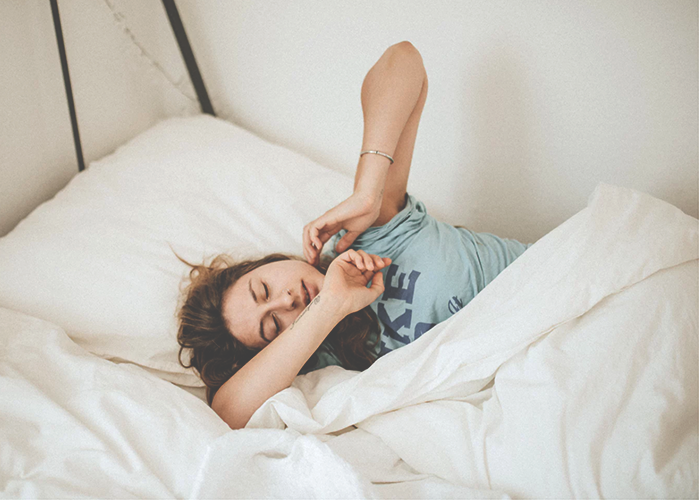6 Reasons You’re Not Getting Enough Sleep, & How To Start

Sleep is always getting in the way, interrupting work and fun alike almost every 24 hours. Who needs it?
Until Amazon starts shipping cyborg replacement bodies, you do — and, chances are, you’re not getting enough of it. According to the National Sleep Foundation, young adults need between seven and nine hours a night to maintain their overall health and well-being. If that sounds like an “old person’s problem” to worry about later, think of it this way: better rest leads to better work, which leads to better grades and better money, as well as better leisure time. It can also help you avoid high blood pressure, weight gain, and higher risk for diabetes and heart attack — but, again, old people problems.
If you have trouble getting that magical seven-to-nine, there may be something well within your control to make it happen. Here are six all-too-common reasons you’re probably not getting enough sleep:
1. You’re still plugged-in.
Your TV, laptop, tablet, phone, or whatever screen you’re compulsively watching at bedtime (just admit it) gives off a light that tells your brain to stay awake — not to mention that just interacting with electronics in general tends to keep people more in “work” mode than “rest” mode. Adjusting the blue light filter on your devices can help a little, but that’s more for eye strain than shut-eye. Yes, it’s tough, but it’s better for your body’s circadian rhythm (that internal clock nagging you to sleep) to unplug an hour, or at least 20 minutes, before going to bed.
2. Your room isn’t sleep-friendly.
Is your bedroom cool and dark? To create an optimal sleep atmosphere, turn down the thermostat, and turn off that neon Shock Top sign — or, better yet, just get rid of it. Also, you don’t want to be staring at an LED alarm clock all night: turn it to the wall, as exposure to even minimal light can interfere with sleep patterns. But don’t go full-on vampire tomb, because your circadian rhythm (that again) would rather you rise with the sun instead of the jarring noise of an alarm, which can leave you feeling “off” no matter how much sleep you managed to get.
3. Your mattress sucks.
You’ve probably spent more on your clothes in the last 10 months than on your bed in the last 10 years. Not judging; you look great. However, a new mattress can do wonders for your sleep life. If you can’t remember when you got your mattress, or even where it came from, it’s time to upgrade. And it doesn’t have to be a huge expense, especially for singles: a high-quality full-size mattress is a smarter investment than a mediocre larger bed. The new, better-rested you is going to spend a lot of time on that mattress — make it a comfortable one.
4. You’re over-caffeinated.
Another cup or three of coffee seems like the answer to a sleepless night, but it’s a vicious cycle of buzz. Depending on the time of day, that caffeinated drink you’re using to stay alert can also keep you up later in the evening, and the cycle starts all over again. Fortunately, though the body absorbs caffeine quickly, it also expels it nearly as fast: within five to seven hours, half of it is gone from your system; 75% after 10 hours. Drinking caffeine later in the day affects the rest of your night, so try to down your last afternoon jolt at least six hours before bedtime.
5. You’re boozing to snooze.
As a depressant, a stiff nightcap may help you fall asleep, but it doesn’t necessarily let you stay asleep. Like caffeine, alcohol exits the system quickly, making for a restless slumber which can leave you wide awake far earlier than you wanted (on the upside, you’ll be urinating more frequently, so it’s probably convenient that you’re up at 4 AM). Moderate to high amounts of alcohol can also lead to a decrease in REM (rapid eye movement) sleep, a period theorized to be one when the brain renews and resets itself. (And let’s not even get started on hangovers.)
6. You’re stressed out.
Between work, school, and whatever curveball life decides to throw at you today, there’s plenty to be anxious about — don’t stress over the one thing that can help you better deal with it all: a good night’s sleep. A “sleep debt” can build upon itself over time, leading to health problems far more serious than drowsiness. Take the time to wind down, whether through reading (an old-fashioned paper book, not a screen — see No. 1 above), writing down tomorrow’s to-do list, meditation, or even yoga, which can lower cortisol (the “stress hormone”) levels in the brain.
*****
Like food, water, oxygen, and Instagram, sleep is an unavoidable human requirement. It’s imperative to both physical and mental health, and you’re not alone if you’re falling short of seven to nine hours of shut-eye. But, now that you have these six causes and fixes to work with — and there are others to explore — you’ll be able to address it head-on. Don’t fall for the old “I’ll sleep when I’m dead” cliché; sleep better now, and get on with living.
Parinaz Samimi is a certified yoga instructor and sleep and wellness expert. She is passionate about sharing her experiences to help inspire and empower others to cultivate happiness, health, and productivity. Having both a Masters in Public Health and one in Business Administration, she has taken great interest in sleep and well-being — specifically their relationship with and correlation to health and productivity. In her free time, she can be found traveling, exploring the outdoors, and enjoying a good book over a glass of Malbec.
Image via Unsplash




